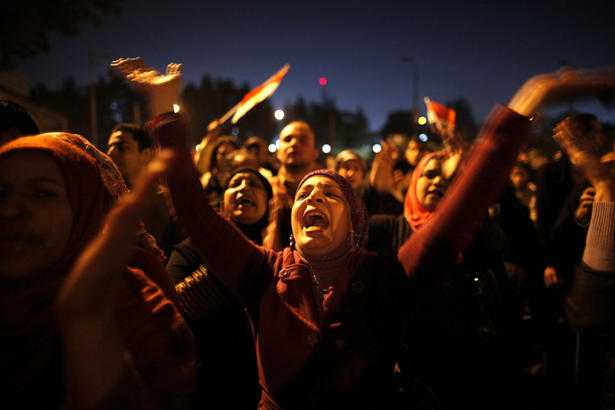By Haroon Siddiqui Editorial Page
Transformation from dictatorship to democracy is never easy. Egypt’s mess, therefore, is not surprising.

It is helpful to compare Egypt with the region’s other large Muslim nation, Turkey, which has taken huge strides toward liberal democracy.
It is also useful to discard our clichés on the Middle East.
Not all “Islamists” are illiterate bearded zealots and women in niqabs. The Muslim Brotherhood includes highly educated professionals. Mohammed Morsi is a Ph.D. in engineering from California. His cultural references include Gone with the Wind and Planet of the Apes. He says his U.S.-born son can aspire to the White House.
Not all his opponents are secularists. Critics include women in hijab worried over women’s rights, and believers who don’t want a Muslim version of George W. Bush, who waged war on Iraq claiming that he had consulted God.
Not all secularists are liberals, either. Some are fascist. They include nationalists, such as the Turks who resist Turkey joining the European Union. Others are intolerant of opposing viewpoints and those who don’t look or talk like them — some show the same animus toward Islamists as Western Islamophobes. Yet others invoke secularism to rationalize authoritarian rule.
Morsi is Egypt’s first elected leader. His three predecessors since the 1952 overthrow of the monarchy were military men — Gamal Nasser, Anwar Sadat and Hosni Mubarak. The Muslim Brotherhood was outlawed until last year. It has won every election since.
In Turkey, the military carried out four coups since 1960. In ousting the last elected government in 1998, it deemed the prime minister an Islamist. His colleagues rebranded themselves as the Justice and Development Party, which has won every election since 2002.
Prime Minister Tayyip Erdogan faced stiff opposition every step of the way in asserting civilian control over the military and other elements of the so-called Deep State, including the judiciary and bureaucracy. This shadow government used the bogey of “Islamism” — that Erdogan was out to establish a theocracy like Iran’s, or a new Ottoman sultanate. The army threatened another coup in 2008 because the wife of the presidential candidate, Abdullah Gul, wore a hijab.
The establishment in Istanbul and Ankara tried to discredit Erdogan as representing the peasantry from backward Anatolia where voters are unfit to exercise their franchise. Ironically, a similar denigrating argument is used by European racists and xenophobes to rationalize the marginalization of Turkish immigrants in Germany, Holland and elsewhere.
In Egypt, the army refused to go away even after Mubarak was toppled. It stripped the newly elected Morsi of his presidential powers. The judiciary dismissed the elected parliament. Other elements of Egypt’s own Deep State tried to sabotage the elected representatives. Others think that uneducated or ill-educated rural masses do not deserve the vote — a yardstick by which a big chunk of the American electorate would be disqualified.
This is not to say that all opposition in Turkey or Egypt is unprincipled. But there’s no mistaking the undemocratic nature of much of it.
The parallels end there.
Turkey’s economy is $1 trillion, Egypt’s $250 billion — and sinking. Turkey has been a member of NATO since 1952, while Egypt has been a client state of America. Turkey has been a democracy for decades, albeit an imperfect one, whereas Egypt has had authoritarian rule and its only current locus of electoral legitimacy is Morsi, whose job is still being defined.
While Erdogan and colleagues are seasoned politicians, Morsi is a neophyte. While they have been gradualists, Morsi and the Brotherhood have been impatient. While they tamed the army, Morsi and the Brotherhood have made a pact with the devil. The new constitution guarantees that the defence minister would be an army person, and that the military budget would have little civilian oversight.
As Egypt muddles toward democracy, outsiders must help. Or risk another Algeria, where the army annulled the 1993 election won by the Islamists, causing civil war. Or Gaza, where Hamas won in 2006 and was deemed a terrorist entity, only to emerge stronger since. Or Pakistan, where the military never let elected governments take hold.
By contrast, wherever Islamists have been allowed as legitimate participants in the electoral process, they were forced to moderate themselves. When they didn’t, they were defeated and marginalized. That’s the magic of democracy.
NB: Last Sunday, I said that Egypt’s new constitution restricts freedom of religion to monotheistic religions, and “thus Hindus, Sikhs, Zoroastrians, etc., get no rights.” That’s wrong, on two counts. Sikhs and Zoroastrians also consider themselves monotheists. Second, the constitution guarantees freedom of religion to all citizens but grants special rights to Muslims, Christians and Jews. Therefore, it’s the non-Abrahamic faiths that won’t have the same rights as the other three.
I apologize for my clumsiness.
via Siddiqui: Clichés cloud view of Egypt and Turkey – thestar.com.

Leave a Reply